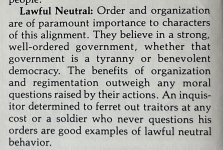You are using an out of date browser. It may not display this or other websites correctly.
You should upgrade or use an alternative browser.
You should upgrade or use an alternative browser.
D&D 5E (2014) Is trafficking in soul coins ostensibly evil?
- Thread starter ECMO3
- Start date
Whizbang Dustyboots
Gnometown Hero
"Participation" is probably the key word here. Not actively owning or trading in slaves would probably be Lawful Neutral (if not particularly nice). Making any sort of profit off of it would get them into evil territory, I agree.A Lawful Neutral character who participates in the slave trade is going to become Lawful Evil incredibly quickly.
Necropolitan
Legend
Rakshasas before 5th Edition beg to differ. They were narcissistic hedonists and Lawful Evil Outsiders.Being dedicated to ones discipline in my mind, is not Law, at a cosmic scale.
Yeah. "Treating people as property is Evil, not Neutral" shouldn't be a controversial take."Participation" is probably the key word here. Not actively owning or trading in slaves would probably be Lawful Neutral (if not particular nice). Making any sort of profit off of it would get them into evil territory, I agree.
billd91
Not your screen monkey (he/him) 🇺🇦🇵🇸🏳️⚧️
No, but “participation” probably is something more controversial. What constitutes participation - willing, unwilling, active, passive? And does it matter if you have or lack the power to change things, given the situation you’re in? That’s one of the most insidious traps of the alignment debate and requirements of being Good. A lot of people in alignment debates effectively require Good = perfect, even to the point of personal extinction.Yeah. "Treating people as property is Evil, not Neutral" shouldn't be a controversial take.
Scribe
Legend
Rakshasas before 5th Edition beg to differ. They were narcissistic hedonists and Lawful Evil Outsiders.
I'm not concerned with someone else's potentially incorrect decades old interpretation, but I would consider narcissistic hedonism likely a shade of Evil, as the root of Evil to me, is selfishness.
Law doesn't enter into that example though, for me.
EzekielRaiden
Follower of the Way
Lawfulness is a method. Goodness is a goal. The two are fully compatible: pursue what is Good by the methods of Law to the best of your ability. Law does not absolutely prohibit rebellion or defiance. It places high expectations on such behavior, true, but it is perfectly Lawful Good to declare that, because a given law pursues a morally evil end, that law has forfeited its justification. Not only can it be opposed, it must be opposed: by its removal and, if warranted, replacement. (Laws permitting slavery do not need to be replaced. Laws with worthy intent but unworthy execution should be replaced.)A lot of people here are weirdly conflating lawfulness ("is it the rule of the land") with goodness ("is this an act that hurts or harms others").
It's been a while since we've had a good old fashioned alignment war, but maybe it's time for one again.
Lawful people prefer to work within the existing system...so long as that system is worthy. If the system itself is Evil, the only Lawful Good choice is to oppose it: uphold the correct standards and rules, defeat and depose the existing system, and replace it with a better one. No system is perfect, but a better system is often quite achievable.
Ruin Explorer
Legend
It's a reasonable question, and maybe it generally doesn't. But when that dude is in your party? Yes it does lol. Otherwise you are literally "party" to it!Does being good require actively stopping evil any more than being evil requires actively stopping good? One could argue that you are engaging in an evil act just by knowing about it and not doing anything. But that makes most of society look bad, so I can see why most folks don't go that far.
Ruin Explorer
Legend
I think it's pretty easy to say that it has to be willing and active to count as actual Good/Evil in most cases.No, but “participation” probably is something more controversial. What constitutes participation - willing, unwilling, active, passive? And does it matter if you have or lack the power to change things, given the situation you’re in? That’s one of the most insidious traps of the alignment debate and requirements of being Good. A lot of people in alignment debates effectively require Good = perfect, even to the point of personal extinction.
Sure! I don't think I said otherwiseWhich is what I should be doing as Lawful Neutral ....
R_J_K75
Legend
It hasnt? The OP is talking about LN."Lawful" doesn't mean you just do whatever is lawful where you are. It's never meant that.
1E & 2E Definition of LN
Attachments
Similar Threads
- Locked
- Replies
- 43
- Views
- 6K
- Replies
- 123
- Views
- 22K
- Replies
- 20
- Views
- 6K
D&D 5E (2024)
Let's make 5e specific setting, starting with a pantheon
- Replies
- 35
- Views
- 3K
Recent & Upcoming Releases
-
June 18 2026 -
October 1 2026




